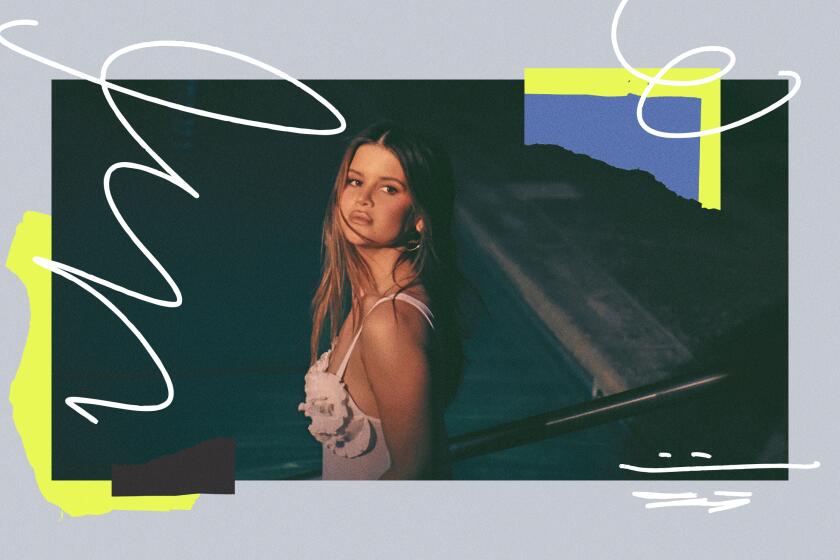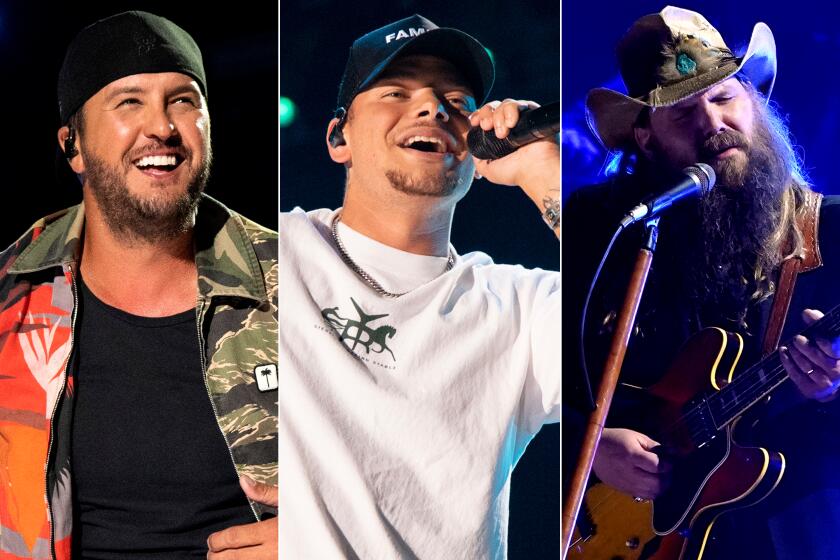How Lainey Wilson, an ‘11-year overnight sensation,’ became country music’s brightest new star
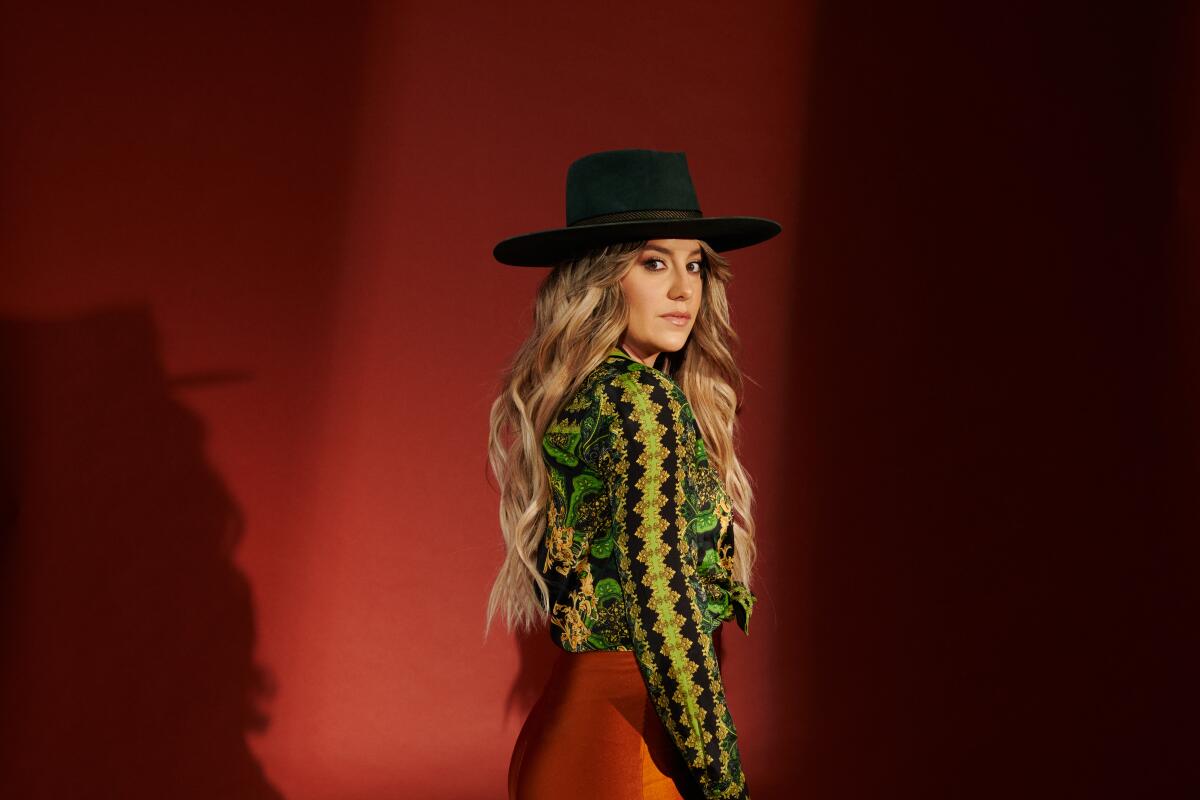
NASHVILLE — Lainey Wilson’s first paying gig as a singer was the grand opening of a convenience store in her tiny hometown of Baskin, La. She was 9 years old, and the job paid 20 bucks.
“My daddy took me up there — no guitar, no microphone, no nothing — and I just sang a cappella,” Wilson, now a country star with a pair of No. 1 radio hits to her name, recalls in her thick Louisiana accent. Later she’d sing in the aisles of Walmart after her parents would stop fellow shoppers to show off their gifted daughter with the preternaturally soulful voice. These days you can imagine a video of one of these performances going viral à la Mason Ramsey’s famous Walmart yodel. But this was the early 2000s, before every human with a smartphone became an amateur talent scout.
“Where was TikTok when I needed it?” Wilson asks with a laugh. “Would’ve saved me a lot of damn time.”
Minus the internet shortcut, Wilson took the scenic route to her dreams, moving to Nashville in 2011 in a 20-foot bumper-pull camper trailer she called home for years — “The heater couldn’t keep up in the winter,” she says, “so I was sleeping in coats and four pairs of socks” — as she sang in bars and knocked on doors. The old-fashioned approach paid off. On Friday she released her vivacious new album, “Bell Bottom Country,” which follows those two chart-toppers: “Things a Man Oughta Know,” about the down-home wisdom she inherited from her folks, and “Never Say Never,” a glossy toxic-romance duet with Cole Swindell.
What’s more, Wilson, 30, leads the field with six nominations at next month’s Country Music Assn. Awards, where she’s up for new artist of the year and female vocalist of the year as well as song of the year (for “Things a Man Oughta Know”) and album of the year (for her breakout 2021 LP, “Sayin’ What I’m Thinkin’”). According to the CMA, Wilson is just the fourth artist — after Glen Campbell, Brad Paisley and Kacey Musgraves — to be nominated for half a dozen prizes in his or her first appearance on the ballot for Nashville’s most prestigious awards ceremony.

“I guess I’ve tricked a lot of people,” she says, grinning slyly beneath one of the flat-brimmed cowboy hats she’s made part of her signature look. Dressed in a brightly patterned Western shirt and flared trousers, Wilson — who’s set for a recurring role as a musician in the upcoming season of the smash TV series “Yellowstone” — is kicked back at her manager’s office in Nashville on a recent afternoon as she sips a LaCroix, the flavored sparkling water she used to hate until she got COVID. “I don’t know if my taste buds changed or what, but now I love this stuff,” she says. “Makes me feel like I’m drinking something bad when I’m not.”
Asked how it feels to be feted as the country industry’s shiniest new act after grinding it out for more than a decade, Wilson chuckles. “What do they call it? The 11-year overnight sensation?” she says. “There’s definitely been times when I was like, Dang, I wish this would’ve happened sooner. But I feel like I’ve got more to say now. I’ve been through more life. I’ve been through more heartbreaks.”
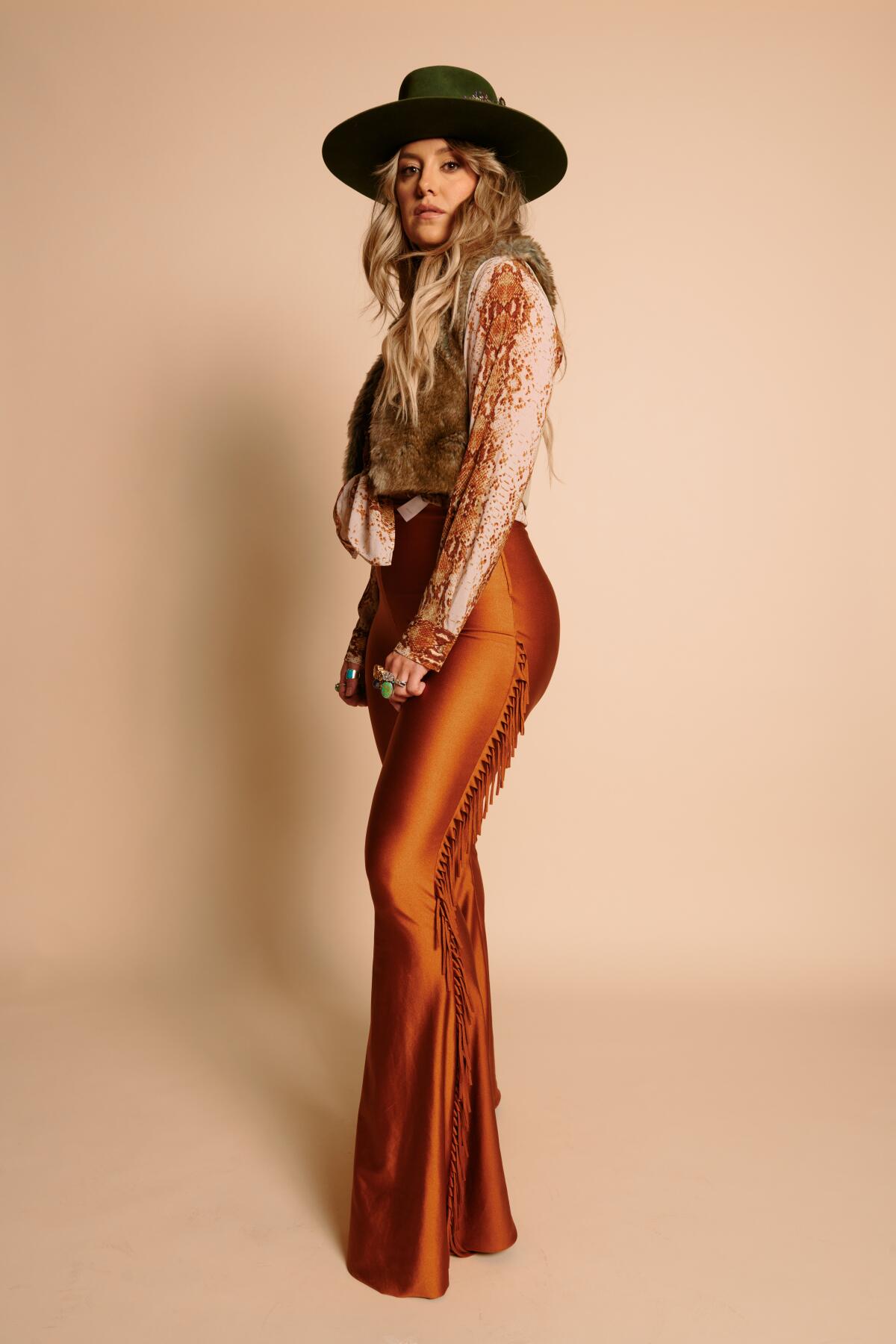
Wilson’s experience is easy to hear on the beautifully lived-in “Bell Bottom Country,” her second full-length for Nashville’s Broken Bow Records, which signed her in 2019 on the strength of two earlier independent projects. Produced by Jay Joyce (known for his work with Miranda Lambert and Eric Church), the album blends crusty guitars, juicy bass lines and funky, hard-hitting drums in songs Wilson co-wrote about family, religion, young love and the blessing-slash-curse of a bone-deep wanderlust. That’s the subject of the album’s lead single, “Heart Like a Truck,” which showcases the emotional range of the singer’s voice — from a pleading murmur to a full-throated yowl — and which is steadily climbing Billboard’s country airplay chart.
“You hear the title and you think, OK, here we go, another truck song,” Wilson says, punctuating the thought with a sad-trombone sound. “But it’s actually got nothing to do with a truck. It’s about finding freedom and strength and not being ashamed of the scratches and dents you get along the way.”
Joyce compares Wilson to Dolly Parton — Wilson’s idol, as it happens — and says he finds her “realness” refreshing. “There’s nothing put-on about Lainey,” says the producer. “She’s not store-bought.”
Morris, who sparred with Jason and Brittany Aldean over their transphobic social media posts, says that country music is fractured, and that’s not a bad thing.
Yet Wilson’s success also reflects a moment of incremental change in Nashville, which after years of largely neglecting female artists is starting to make more room for women. In April, Lambert and Elle King’s “Drunk (And I Don’t Wanna Go Home)” became the first track by two women to reach No. 1 at country radio since 1993; then Carly Pearce and Ashley McBryde got there again in May with “Never Wanted to Be That Girl.” At the CMAs, Lambert and Carrie Underwood are both nominated for the third year in a row for the night’s top prize, entertainer of the year; before 2020, it had been two decades since more than one woman was in the category. (That no woman has actually won since Taylor Swift in 2011 shows an imbalance still persists.)
Wilson — who has a second hit on the radio with “Wait in the Truck,” a stark duet with Hardy about domestic violence — says that when she came to town, “They told me if you don’t make it by the time you’re 23 or 24, you need to take your ass back to the house.” After she passed that age and an interviewer would ask how old she was, she’d smile and say, “Didn’t your mama teach you better than that?” Now, though, “I’m like, ‘Hell yeah, I’m 30 years old,’” she says. “This is the best year of my life, and I’m proud of that.”
Wilson, whose dad is a farmer and mom a teacher, grew up in Baskin (population: approximately 250) listening to Lee Ann Womack, the Judds and Tim McGraw. “I didn’t realize when I was little that country music was a genre,” she says. “In that area — no stoplight, just a bunch of cornfields — it was just a way of life.” Her grandmother was the first person to recognize that she could carry a tune, though it was a childhood trip to Dollywood, she says, that convinced her she wanted to be a musician. By 11, Wilson was playing guitar and writing songs “about tequila and cigarettes”; in high school she worked as a Hannah Montana impersonator, sometimes opening shows with a set of her own material under her real name.
Does she have a favorite Hannah Montana song? “I mean, ‘The Best of Both Worlds,’ of course,” she says. “Everybody knows it. But I’ll tell you — and I know it’s technically a Miley Cyrus song — ‘The Climb’ is up there.” Today the power ballad’s co-writer Jessi Alexander is one of Wilson’s best friends; she even has a cut on “Bell Bottom Country.”
Wilson describes the new album’s vibe as “country with a flair”; Joyce, she says, “figured out how to make the music almost sound the way that I dress.” In the studio they thought about “classic rock and old country,” says the producer, and went for “arrangements that aren’t blueprint verse-chorus-verse-chorus-bridge-chorus.” There’s wah-wah guitar in “Grease” and a quasi-reggae breakdown in “Road Runner,” and the LP closes with an unexpected cover of 4 Non Blondes’ early-’90s hippie-grunge hit “What’s Up?”
“I used to sing it with a cover band back at home, and it was one of those that killed every time,” Wilson says. She recently talked with 4 Non Blondes’ Linda Perry, whom she calls “the most intimidating person I’ve ever met. Bad to the bone. I didn’t even know if she liked me when we left, but later I called her to tell her we cut the song and she was like, ‘It’s so good to hear your voice.’”
For all the enthusiasm around “Bell Bottom Country,” it’s not hard for Wilson to remember the indifference she encountered on her first radio tour in 2019, “visiting six or seven stations a day, playing to people on their cellphones.” Given how long she’d worked just to get signed, she was happy to put in the work; her approach back then was “to be nice to everybody — to basically run for mayor,” she says. “But I remember this one guy telling me I was no good and how he hoped I wouldn’t cry when I left the station. I leaned over his desk and I said, ‘With all the years I’ve been in Nashville, you saying that to me ain’t s—.’” She laughs at the memory. “This is probably a psycho trait of mine, but that just made me want it that much more.”

Her work ethic pushed her again this past summer when she traveled to Montana to shoot “Yellowstone” even as her father was in the hospital after suffering a stroke. “We thought we were gonna lose him,” she says. “I told the show I couldn’t come. But then I found out they’d hired a bunch of people to be on set, and I was like, Daddy is the hardest-working man I know — he would want me to go do my job. So I changed my mind and I went. But I was crying in between takes.” (This week Wilson told fans that her dad is recovering at home after a series of surgeries.)
Wilson views “Yellowstone,” whose fifth season will premiere Nov. 13, as part of the reason that “country is kind of becoming cool again. For a minute there, I don’t know if it was cool. But now you see all these kids on TikTok acting like cowboys when they ain’t never rode a horse in their life.” At next year’s Stagecoach festival, Wilson is scheduled to perform alongside two other musician-slash-actors from the wildly popular western series: Ryan Bingham and Luke Grimes.
The 2023 edition of the annual Stagecoach country music festival at Indio’s Empire Polo Club will star Luke Bryan, Kane Brown and Chris Stapleton.
Even so, Nashville has been riven lately by a kind of culture war between young liberal acts such as Maren Morris and slightly older conservative stars like Jason Aldean. Last month, Morris — who’s traded barbs online with Aldean and his wife, Brittany, over issues related to trans youth — told The Times that perhaps country music had split into two factions and that she might be fine with that.
Asked if she thinks of it that way, Wilson says, “Well, first of all, I hope that whole situation gets resolved in some kind of way,” referring to the feud between Morris (with whom she shares a management firm) and Aldean (with whom she’s toured and shares a label). “But if there are two sides, I feel love from both and I love both.” Does she see an increasing willingness among historically tight-lipped country stars to speak out on politics?
“It’s split,” Wilson says. “Some people are like, ‘Speak up for what you believe in,’ and other people are like, ‘Keep your mouth shut.’ I remember a time when my parents made me feel like it was rude to ask somebody who they were voting for. I just feel like my business is my business. And my job is to get onstage and make sure everybody in that room feels loved.”
Is that hard?
“It’s hard to love some people,” she says.
And she never feels the urge to jump into the fray?
“I really do not.”
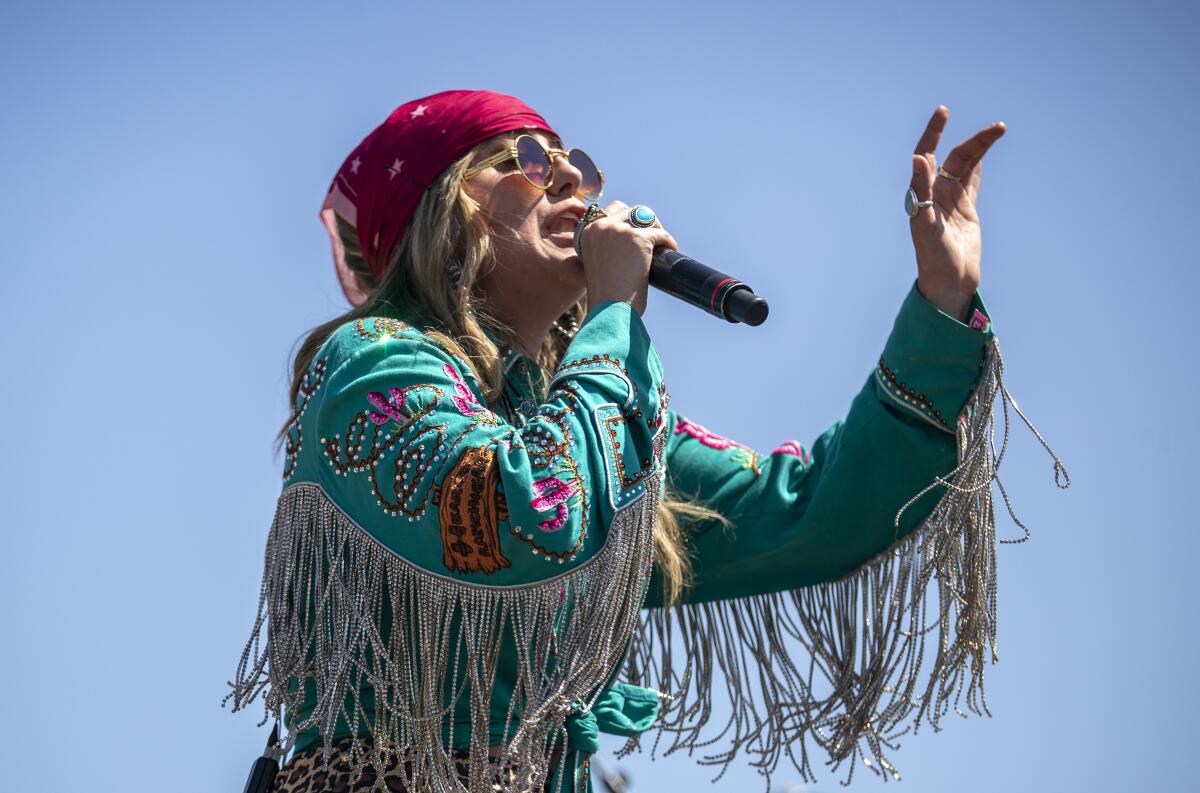
Jon Loba, president of Broken Bow, thinks Wilson bridges a common gap in Nashville. “She’s one of the very few artists who have the cool kids and the very mainstream audience,” he says, adding that the widespread interest in Wilson reminds him of the demand for a young Taylor Swift during his earlier stint at Swift’s old label, Big Machine.
The prospect of that kind of reach excites Wilson, though she has mixed feelings about the loss of privacy that accompanies true celebrity. “Country-music people like seeing a little inside scoop of your life,” she says — one explanation for the countless covers of People magazine showing some bearded country bro or another posing with his lovely wife. “Even if I’m married one day, I don’t know if I’d be posting about my husband all over social media. I mean, Dolly’s husband — there’s like one picture of him on the internet. She’s kept that private, and I think that’s OK.”
Still, winning some of those CMAs sure would be nice after all those cold nights in the camper trailer. Tonight, Wilson is headed to a dinner in honor of this year’s nominees, she says at the end of our talk, “which means I need to go get ready and slap some makeup on this thing.” She ever feel like she’s still running for mayor?
“There’s always more ass to kiss,” she says. Then she smiles. “But not as much.”
More to Read
The biggest entertainment stories
Get our big stories about Hollywood, film, television, music, arts, culture and more right in your inbox as soon as they publish.
You may occasionally receive promotional content from the Los Angeles Times.
